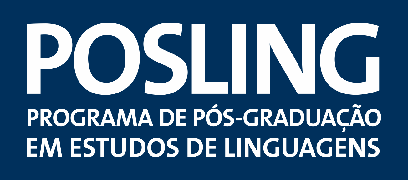
The Post-Graduate Program in Language Studies (POSLING) is linked to the large area of Literature, Linguistics and Arts, and has grade 5 in the evaluation of courses by CAPES . Searching for a new perspective in this field, the area of concentration is Technologies and Discursive Processes, and the program emphasizes the researcher education in tune with the current situation of language studies and the demand for professionals capable of dealing with differentiated languages in the discursive processes which involve cultural and social relations. Two courses are offered: Master and Doctorate.
The program aims to deepen knowledge about the relationship between technology, language and discourse, associating the diverse practices and products of man with the achievements of discursive production.
Under an intersemiotic and interdiscursive perspective, language studies enable a comparative approach of verbal and nonverbal texts from different fields of culture, from different fields of knowledge. It highlights the relevance of the roles of technology in contemporary society and the use of language linked to these roles in various contexts of human action: literature, communication, education, publishing, and others.
It is important to point out that Posling has become a truly interdisciplinary space for discussion, without losing its focus on language studies. Concepts and techniques have been borrowed, translated or adapted from various areas, the formation of groups of non-homogeneous previous background and the integrative way in which we have dialogued with these elements help us to constitute a space for research and discussion in Languages, giving it the interdisciplinary and open character .
The area of concentration, in turn, is composed of four lines of research.
I - Literature, Culture and Technology: Study of literary, modern and contemporary art and related criticism. Analysis of historical-cultural relations inherent to the artistic and literary field. Reflection on the process of building philosophical and technological knowledge in the cultural dimension. Study of the relations between literature, art and technology.
II - Discourse, Media and Technology: Analysis of the mechanisms of meaningmaking in relation to different languages and their respective constitutions in different genres and supports. Reflection on the role of the media and study of devices and media texts. Analysis of the interference of technologies in discursive production and reception.
III - Language, Teaching, Learning and Technology: Studies of the modalities of language and literature teaching and learning with basis in the different theories of language. Reflection on the role of teaching materials and information and communication technologies in teaching and learning languages and literatures.
IV - Edition, Language and Technology: Creation and edition processes in image, sound and word. Study of the relations between languages, creation, edition and media convergence. Historical, social, educational and technological aspects of invention and editing. Publishing, design, visual programming. Artistic-literary production. Didactic production. Networks and productive chains: authorship, circulation and reception. Professional training policies in editing.
CONTACT INFO
Secretary: Karen Antonieta
Telephone: (31)3319-7139
E-mail: posling@cefetmg.br
- - http://



